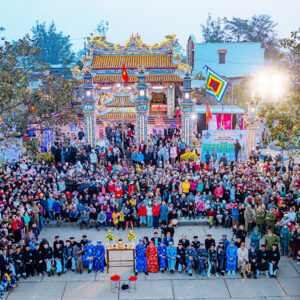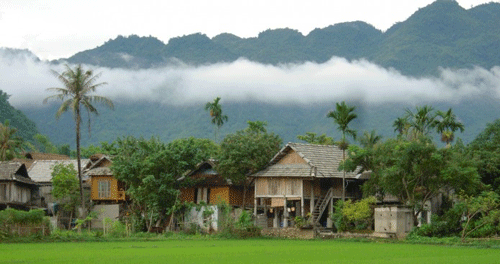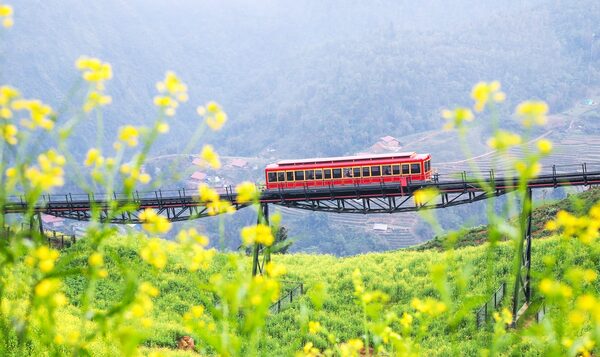After implementing the ‘open doors’ policy and going through the process of international economic integration, Vietnam is developing day by day. The country also absorbs the culture of the world. However, with a thousands of years long history, Vietnamese people still preserve many traditional festivals.
Besides many holidays, here are outstanding Vietnamese traditional festivals tourists should not miss when visiting Vietnam in 2025
Vietnamese Lunar New Year
As the most important holiday of Vietnamese people, the Lunar New Year is also the longest holiday and usually lasts from 7 to 10 days. The Lunar New Year is a time when people often return home and gather together during the holiday.
Many traditional customs are present in the Vietnamese Lunar New Year such as:
– Offering ‘Ong Cong, Ong Tao’ (Kitchen Gods) on the 23rd day of the last month of the lunar year
– New Year’s Eve worship at midnight, the time of transition between the old and the new year
– Wishing the elderly a healthy, long life in the new year
– Giving money and wish children eat well, grow up quickly

The Lunar New Year is not only a festival, it is also an important time for almost all Vietnamese. On the occasion of the Lunar New Year, the festival seems to take place everywhere, in all families and on each person’s face.
When traveling to Vietnam during the Lunar New Year, visitors not only have the opportunity to learn about this traditional Vietnamese holiday but also have the opportunity to participate in many other festivals held all over the country.
Lunar New Year in 2025 falls in January with January 29th being the first day of the lunar new year. It is expected that the Vietnamese New Year 2025 holiday time will be from January 25th to February 02th, 2025
Lim festival
Vietnam is a country with many traditional folk songs such as Cheo, Tuong, Cai Luong, Quan Ho, etc. Lim festival is a festival honoring Quan Ho folk songs held annually on the 13th day of the first month of the lunar year.
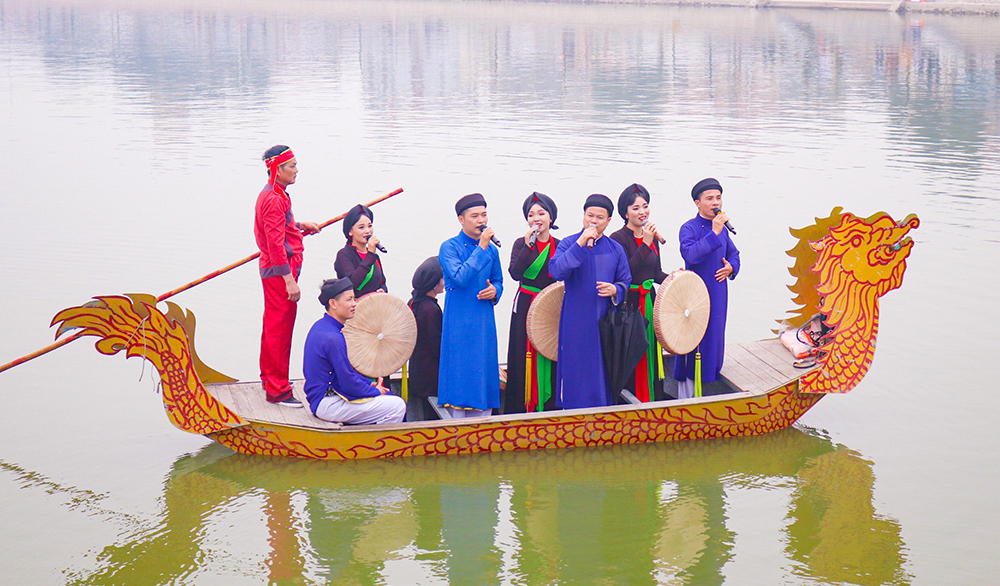
Lim festival
The annual Lim festival is held in Lim town, Tien Du, Bac Ninh (30km from Hanoi). In 2025, the main festival day is on February 10th, 2025 and lasts for 2-3 days.
Perfume Pagoda Festival
Buddhism plays an important role in Vietnamese culture and traditions. Many Vietnamese are non-Buddhist but are still greatly influenced by Buddhist rituals such as ancestor worship and temple worship.
Perfume Pagoda has a history of hundreds of years, is a cultural-religious complex of Vietnam, including dozens of Buddhist temples, some temples worshiping gods, communal houses, worshiping agricultural beliefs.
The center of Perfume Pagoda is located in Huong Son commune, My Duc district, Hanoi (60KM from Hanoi center).
Every year, the Perfume Pagoda festival is held on the 6th of the first month of the lunar year. The Perfume Pagoda Festival lasts for about 3 months, but visitors can visit this complex at any time of the year.
Giong Festival
Giong Festival is a festival held in some different places in Vietnam to praise the feat and commemorate the legendary character Saint Giong (Thánh Gióng), who had the merit of fighting foreign invaders thousands of years ago.
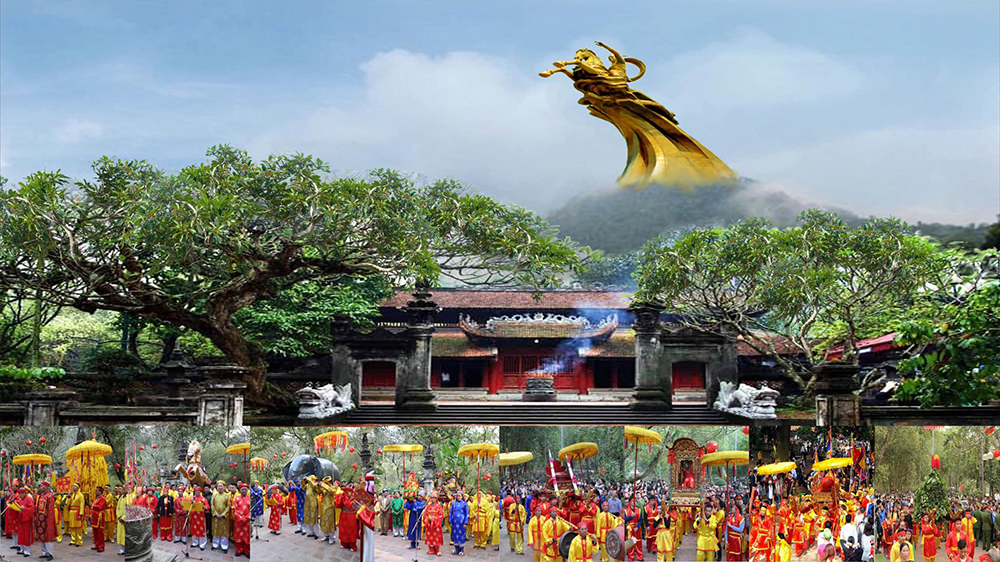
Giong festival
There are two typical Giong festivals in Hanoi, the Soc Son Giong festival in Soc temple, Phu Linh commune, Soc Son district. The festival is held on the 6th to the 8th of the first month of the lunar year (In 2025, the festival falls on February 03th, 04th and 05th).
And, the Giong Phu Dong Festival at Phu Dong Temple, Phu Dong Commune, Gia Lam District, which has been registered by UNESCO as an Intangible Cultural Heritage of Humanity. The festival is held annually on the 8th and 9th day of the fourth lunar month (In 2025, it falls on May 24th and 25th). Giong festival is one of the most special festival of Vietnamese traditional festivals
Hung Kings Temple Festival – one of most important Vietnamese traditional festivals
The Hung Kings are considered the founders of the Vietnamese nation. Hung Kings Temple is a complex of temples to worship the Hung Kings and the king’s royal family on Nghia Linh mountain (Viet Tri, Phu Tho, 90km from Hanoi).
The Hung Kings Temple was built hundreds of years ago with the main festival being held on the 10th day of the third lunar month every year (In 2025, the festival falls on April 07).
Ancestor’s Anniversary (Ngày Giỗ tổ) is currently an official holiday in the annual working schedule of the Vietnamese government. The date is one of the most important time among other Vietnamese traditional festivals
Central Highlands Gong Festival
On November 25, 2005, the Central Highlands Gong Culture of Vietnam was officially recognized by UNESCO as a Masterpieces of the Oral and Intangible Heritage of Humanity.
Currently, in most of the villages of the Central Highlands, there are gong teams to serve the people in community activities and in summer festivals. Each ethnic group has its own gong music team to express the natural beauty and human aspiration… The Giarai have gong songs Juan, Trum resound, the Bana people have gong songs: Xa Trang, Sakapo, Atau, Toroi
The Central Highlands Gong Festivals do not have a fixed dates of the year. Tourists can casually attend these festivals in the provinces: Dak Lak, Lam Dong, Kontum, Dak Nong, Gia Lai
Elephant racing festival
The festival is held around the third lunar month and usually lasts about 3 days, the time when people here start before entering the forest to clear the fields at Ban Don, Krong na commune, Buon Don district, Dak Lak province.
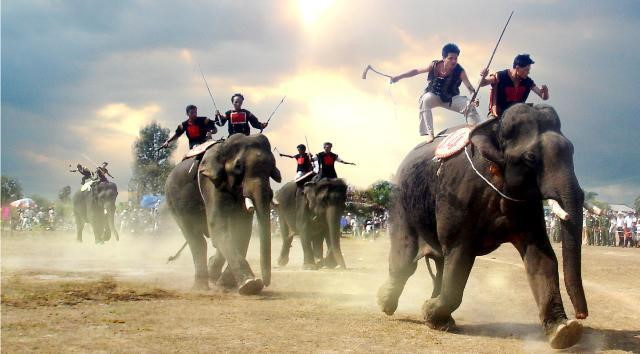
Elephant racing festival
The famous Central Highlands elephant racing festival is always chosen by tourists when coming to this mountainous land. The image of the elephant is considered the “mascot” of the Central Highlands.
Festival of Ba Chua Xu Temple on Sam Mountain
Ba Chua Xu Festival is held annually from the night of 23 to April 27 of the 4th month of lunar calendar at Ba Chua Xu Temple in Nui Sam ward. Chau Doc city, An Giang province.
Ba Chua Xu Temple is located at the foot of Sam mountain, this is an important relic (polite, architectural, spiritual) of the province and region, annually attracting over 2 million pilgrims.

